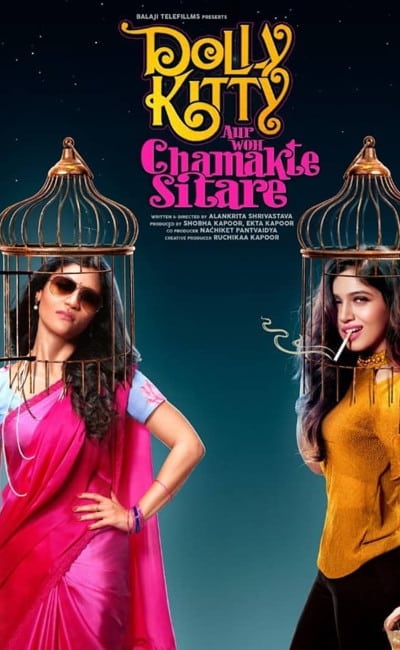
Click here for more about Dolly Kitty Aur Woh Chamakte Sitare, including interviews with Alankrita Shrivastava and Konkona Sen Sharma!
Alankrita Shrivastava is not your run-of-the-mill movie maker. She seems to have made a ritual of living her characters before she gives them life.
Having watched the pain and joy of the characters she sketches, her style of movie-making leaves us astounded.
We first met her during the promotion of her first controversy a few years back when she had visited the bay area for the release of her movie – Lipstick Under the Burka. The humanity in those characters and the essaying of their fears, needs, desires and aspirations stays with the audience long after the curtains have fallen.
Dolly Kitty aur Chamakte Sitare belongs to the same genre of storytelling. A genre less explored yet speaks volumes about the writers and the directors ability to say a lot with less.
The story of two cousins hailing from the Darbhanga district of Bihar (Darbhanga is near the border with Nepal and not a hugely progressive area), finding their lives in the city of the future- Greater Noida ( a satellite town near New Delhi, the capital of India) undergoing rapid urbanization because of proximity to the capital city.

There are facets of story telling that run in parallel, just like the journey of self discovery for the cousins – Dolly and Kitty. Dolly, married with two kids is clear about how to cater to the materialistic needs of her family but has not discovered the process of her own needs as a person. Kitty, on the other hand, is all of us, when we are faced with a new paradigm in liberalism.
Whether it is the sheer system shock for being asked to say “I love you” to clients on phone, without meaning it ( she works for a adult call center service for lonely men) to the Kitty who not only finds a way to sexually satisfy herself without the guilt of being self-serving but also highlighting that men and women may have the same needs and therefore there is a potential market for services to satisfy the loneliness and attention that women require too.
For Dolly, her joy in the apparent marital indiscretion with a delivery boy to appreciate that her indifference towards sex is less to do with her and more to do with her attraction towards her husband. At times, dialogues are not required to understand what the character is thinking. Alankrita has found fluid protagonists in Konkana Sen Sharma and Bhumi Pednekar who achieve that impact without much effort.
In one such powerful interchange between Dolly and her husband, when he realizes that she had been sleeping wih the delivery guy, he provokes her by telling her to feel ashamed about sleeping with someone else while berating him for sexual transgression with Kitty. That epic retort just put everything in place for women and their choices when Dolly (Konkana) retorts, “My sleeping with that man was consensual whereas your touching my sister was not.” That is the difference between the way Dolly satisfied her needs and how her husband tried to satisfy his.
The script is not required for you to understand why the characters are behaving in a certain manner. And neither are dialogues.
That is how powerfully Alankrita Shrivastava has defined these characters.
Hats off to a master class in film making.




